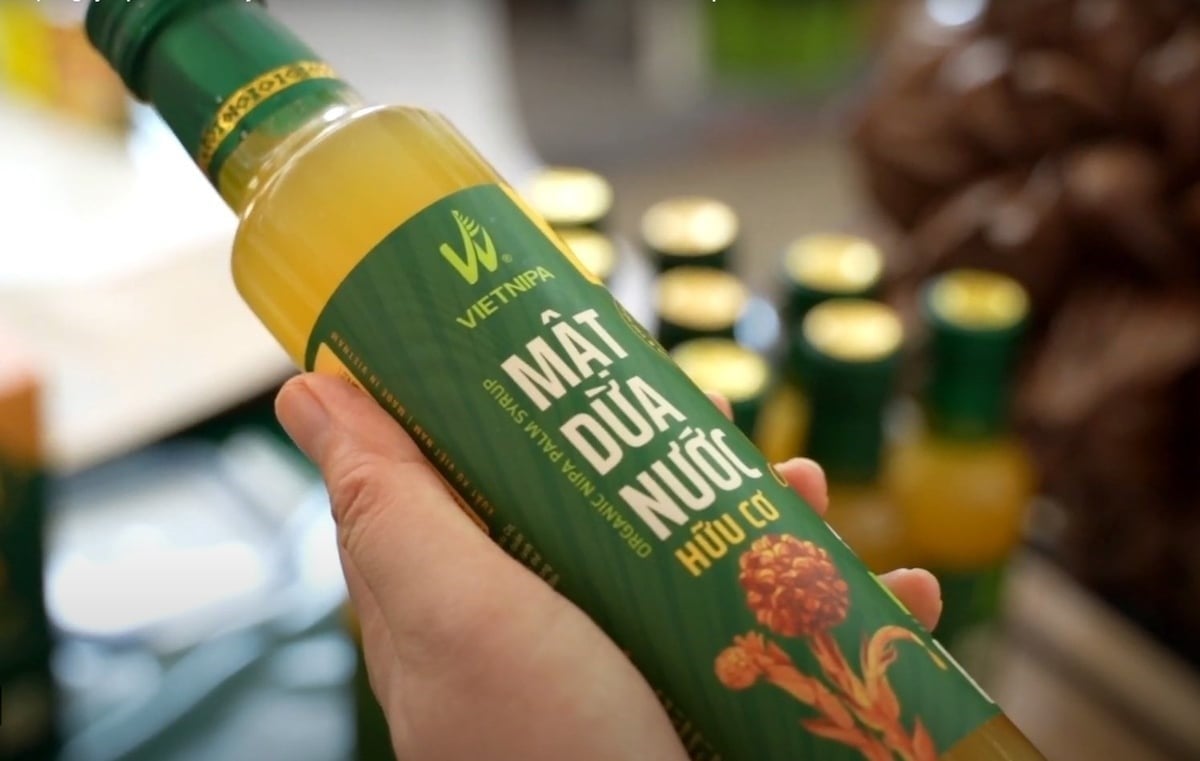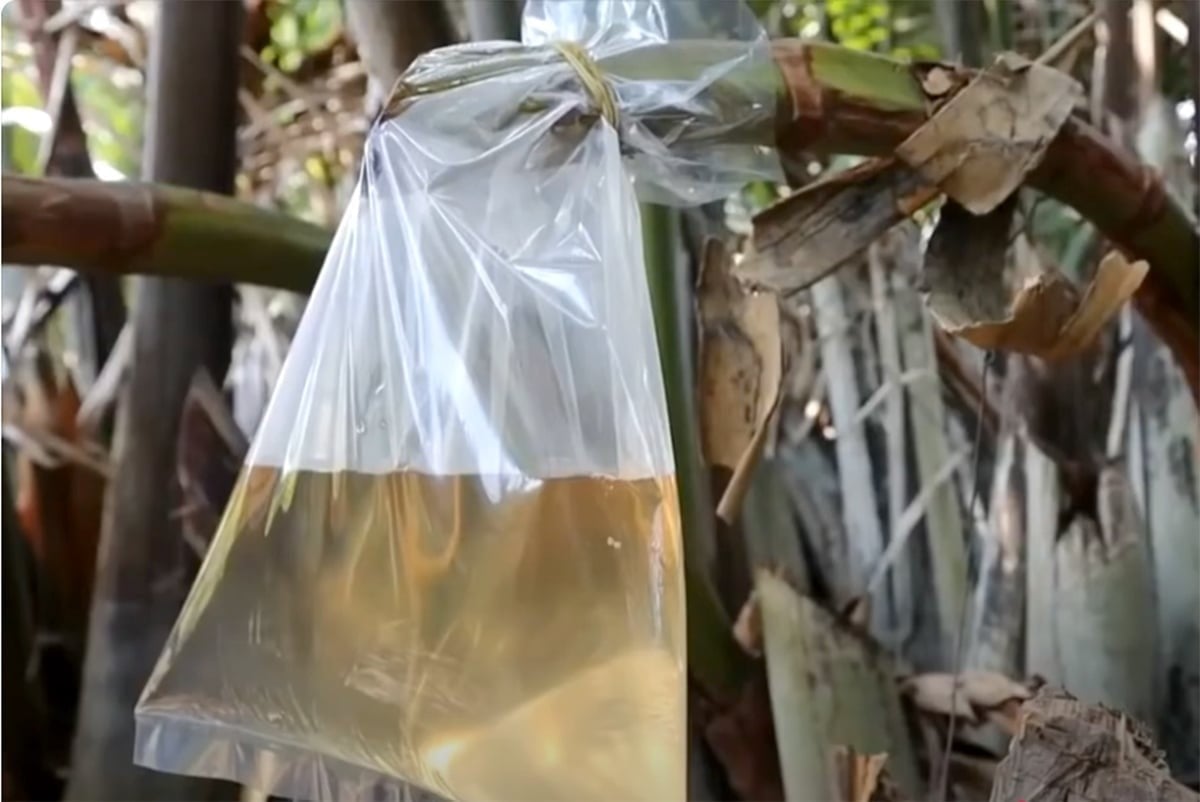June 27, 2025 | 15:26 GMT +7
June 27, 2025 | 15:26 GMT +7
Hotline: 0913.378.918
June 27, 2025 | 15:26 GMT +7
Hotline: 0913.378.918

An organic nipa palm syrup product by Vietnipa. Photo: Son Trang.
Nipa palm is a naturally growing plant species that is extremely popular in southern provinces and cities of Vietnam. In the Southeast region and the Mekong Delta, nipa palm is commonly found in brackish water areas and estuaries.
For many years, Vietnamese people have utilized various parts of the nipa palm in daily life. Its leaves are used for roofing, its water as a beverage, and its meat as a food source.
Recognizing the untapped potential of the nipa palm, several enterprises have recently invested in processing products from this plant species. Among them is Vietnipa, a company based in Can Gio district, Ho Chi Minh City, that has developed nipa palm syrup and sugar products.
Can Gio district has approximately 900 hectares of nipa palm, providing a solid foundation for Vietnipa to establish an organic nipa palm cultivation area that meets USDA, EU, and JAS standards.
According to Vietnipa, nipa palm produces sap flows, also known as palm nectar, from incisions made at the stalk during the harvest of the nipa palm fruit cluster or flower. Nipa palm syrup is extracted from palms that are at least five years old and have bloomed for the second time.
To extract nipa palm syrup, Mr. Pham Minh Tien, Director of Vietnipa, spent considerable time studying technical documents and sap-harvesting methods from several Southeast Asian countries. Based on this knowledge, he developed a “nipa palm massage” process in Can Gio.
Accordingly, the chosen palm stalks must be thick and long, and the fruit clusters should not be too young to ensure quality nectar flow. Once suitable stalks and fruit clusters are selected, Vietnipa workers begin to take care of palm stalks by applying external physical stimulation, known as tapping, before collecting the first drops of syrup that flow from the incision created while harvesting the fruit cluster.
According to Mr. Tien, each nipa palm stalk yields about one liter of nectar per day. The harvesting period lasts approximately 20-30 days before the stalk naturally dries out.

Each nipa palm stalk yields about one liter of nectar per day, with a harvesting period lasting 20-30 days. Photo: Son Trang.
Vietnipa processes two main products from the harvested nipa palm nectar at its facility: pure nipa palm syrup and concentrated nipa palm syrup.
The pure syrup is pasteurized to ensure consumer safety while preserving the natural aroma and fresh, rich flavor of the freshly tapped nectar. This product line is ideal for direct consumption as a refreshing drink and an instant energy booster. In 2022, Vietnipa's pure nipa palm syrup was certified as a 4-star OCOP product by Ho Chi Minh City.
Concentrated syrup is produced using modern concentration technology to retain its nutritional content and deliver a robust sweetness. With a longer shelf life, it can be diluted into a nutritious beverage or used as an ingredient for cooking.
In recent years, Vietnipa has developed a variety of products derived from nipa palm syrup, including organic nipa palm sugar and organic dietary sweeteners.
Through its range of nipa palm syrup and sugar products, Vietnipa aims to offer safe, organic sweetening solutions not only to Vietnamese consumers but also to major international markets with high demand for natural sweeteners, such as the U.S. and the EU. Notably, both the concentrated syrup and nipa palm sugar have a low glycemic index and are rich in minerals, making them suitable for people on restricted diets, including those focused on weight loss, vegetarianism, or managing type 2 diabetes. These products can be used as natural alternatives to honey or dietary sweeteners in cooking and food preparation.
In addition to Vietnipa-branded nipa palm products, the company's nipa palm syrup and sugar have been adopted by various domestic and international partners for use in food production, such as freeze-dried nipa palm by Vinamit and granola and cereal powder products by Lolifood, Lotus Healthy Food, and Tam Minh Food. The products have also been introduced into the F&B and coffee sectors.
Vietnipa is promoting its nipa palm processing operations to enhance the value of this plant species, thereby sustaining nipa palm areas for environmental and ecosystem protection while creating additional employment opportunities for local communities in Can Gio district.
With organic certifications and being recognized as health-friendly, products derived from nipa palm in Can Gio, in addition to conquering domestic consumers, are also gradually accessing international markets.
Translated by Thu Huyen
/2025/06/17/3942-2-143243_548.jpg)
(VAN) Recently, in Sweden, the Secretary of the Binh Dinh Provincial Party Committee presented the Investment Registration Certificate for the 'Polyester Fabric Recycling Complex' project to SYRE Impact-AB Company.
/2025/06/12/3721-2-202745_83.jpg)
(VAN) TH made an impression at Seoul Food 2025 with its line of natural beverages, paving the way for Vietnamese food products to enter the South Korean market.

(VAN) Soc Trang's success in rice exports stems from a strategy of developing fragrant and specialty rice cultivation areas and standardizing production toward low-emission practices.
/2025/06/11/1311-5-120811_839.jpg)
(VAN) The pig farming industry is facing the challenge of comprehensive restructuring to meet requirements for quality, safety, traceability, and market expansion both domestically and for export.

(VAN) Vietnam considers participating in ALGROALBA in order to expand agricultural production, coordinate the assessment and effective exploitation potential land.
/2025/06/05/5314-1-184727_407.jpg)
(VAN) From seemingly worthless fish scales and skin, enzymes and lactic ferments can transform by-products into peptides, opening a sustainable, effective business direction and elevating Vietnamese seafood.